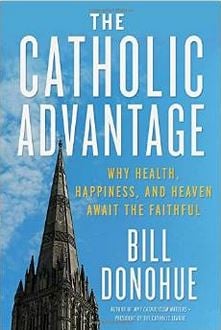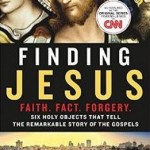 You probably have seen Bill Donohue in action. The feisty president of the Catholic League for Religious and Civil Rights is a frequent commentator on broadcast television and in the media, standing against discrimination and defamation of Catholicism in the public forum. With his characteristic sharp tongue and his moral outrage at brazen offenses in media, in politics and in culture, Donohue is a bulldog for the faith.
You probably have seen Bill Donohue in action. The feisty president of the Catholic League for Religious and Civil Rights is a frequent commentator on broadcast television and in the media, standing against discrimination and defamation of Catholicism in the public forum. With his characteristic sharp tongue and his moral outrage at brazen offenses in media, in politics and in culture, Donohue is a bulldog for the faith.
I saw a different side of Bill Donohue in his new book The Catholic Advantage: Why Health, Happiness, and Heaven Await the Faithful. At least for this work, he has set aside the very real assault on Catholicism which he exposes in his role as watchdog, and has focused instead on what is right and good and true.
* * * * *
Some of Donohue’s earlier writings seem an extension of his pushback against anti-Catholicism, as seen in his outspoken television and radio appearances and in his frequent press releases.
- In The Politics of the American Civil Liberties Union (1985), he exposed the leftist organization which has beat a drum against religious expression in public life.
- In The New Freedom: Individualism and Collectivism in the Social Lives of Americans (1991), he put on his sociologist hat to warn about societal changes.
- In Secular Sabotage: How Liberals Are Destroying Religion and Culture in America (2009), Donohue did what he does most often: He shone the spotlight on those who attack the Catholic Church, explaining the flaws in their secular mindset.
While the incidents of blatant discrimination which he spotlights are true, I find it disheartening to focus on this discouraging aspect of American culture.
* * * * *
But in 2012, Donohue’s work took a turn toward the positive when he wrote Why Catholicism Matters: How Catholic Virtues Can Reshape Society in the Twenty-First Century. This time not content to merely defend the Faith against external attacks, Why Catholicism Matters proposed an alternative view of faith as a noble good which enriches society.
Now, in what seems to me his best book yet, Donohue continues to extoll the Catholic vision as the pinnacle of thought. In the first section, on health, Donohue continues his alliterative thrust by explaining beliefs, boundaries and bonds.
The Catholic Advantage contrasts the Catholic and the secular vision of happiness, citing the richer happiness which can be found in the priesthood and among cloistered nuns. He finds examples of happiness in the lives of Mother Angelica and Mother Dolores Hart and shows how their happiness, grounded in faith, surpasses that of wealthier, better known but narcissistic Hollywood celebrities and intellectuals.
In teaching about heaven, Donohue speaks of the need for surrender, of a holiness rooted in altruism and charitable giving. As an example of the true happiness that is birthed in generosity, Donohue cites the legacy of Frederick Ozanam, the 18th century Frenchman who founded the Society of St. Vincent de Paul.
In contrast, the secular vision of happiness is built, Donohue writes, on utopian ideals such as fraternity and eugenics. As an example, Donohue cites Hillary Clinton, a devotee of big government. Donohue writes:
Drawing on an old African proverb, she said “it takes a village” to raise a child. Not a father or a mother–a village. So convinced was she that she proclaimed that “children will thrive only if their families thrive and if the whole of society cares enough to provide for them” (her emphasis).
But Donohue exposes the error of her thinking:
Yet her husband, who came from a dysfunctional family, with no outside support, still became president.
Donohue’s point is not that families don’t matter, or that children who receive social support won’t thrive. The issue, he contends, is what constitutes social support. It’s one thing for neighborhood associations, civic groups, churches, and voluntary associations to provide social support. What Clinton’s “village” theme advocated, though, was not a strong local response, but rather, an expansion of the powers of big government. And the federal child care programs she envisioned as “supporting” children actually hold an animus toward religion.
There’s much more. Bill Donohue is a sociologist, and his work is well referenced. His conclusion is that the three H’s (health, happiness and heaven) are advanced through the three B’s (beliefs, boundaries and bonds). Religious Americans make the best citizens, and religious institutions benefit everyone; hence, despite resistance from elites, it is in everyone’s interest to make the Catholic advantage more available to everyone.












